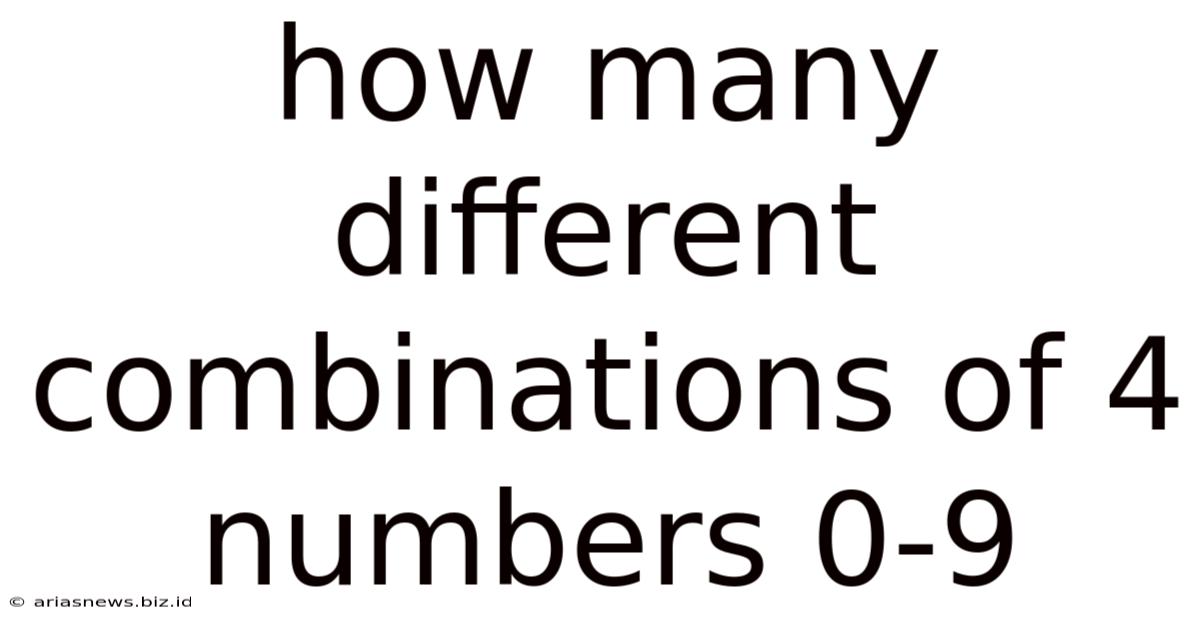How Many Different Combinations Of 4 Numbers 0-9
Arias News
May 12, 2025 · 4 min read

Table of Contents
How Many Different Combinations of 4 Numbers 0-9? Exploring Permutations and Combinations
The question, "How many different combinations of 4 numbers 0-9 are there?" seems simple at first glance. However, the answer depends crucially on whether the order of the numbers matters (permutations) and whether repetition is allowed. Let's delve into the different scenarios and explore the mathematical concepts behind finding these combinations.
Understanding Permutations and Combinations
Before we jump into calculating the number of combinations, let's clarify the difference between permutations and combinations. This distinction is crucial for selecting the correct approach.
-
Permutations: Permutations refer to the arrangements of items where the order matters. For example, the permutations of the digits 1, 2, and 3 are: 123, 132, 213, 231, 312, and 321. Each arrangement is considered distinct.
-
Combinations: Combinations refer to the selections of items where the order does not matter. Using the same digits 1, 2, and 3, the combinations are: {1, 2, 3}. The order within the set doesn't change the combination. {1, 2, 3} is the same as {3, 2, 1}.
Scenario 1: Permutations with Repetition Allowed
This is the simplest scenario. We have four positions to fill, and for each position, we have 10 choices (0-9). Therefore, the number of permutations is:
10 × 10 × 10 × 10 = 10,000
There are 10,000 different permutations of four digits from 0-9 when repetition is allowed. This includes sequences like 0000, 1111, 9999, and all possible variations.
Scenario 2: Permutations without Repetition
Here, things get slightly more complex. Once we've chosen a digit for the first position, we have only 9 choices left for the second position, 8 for the third, and 7 for the fourth. This is calculated using the concept of permutations without replacement:
10 × 9 × 8 × 7 = 5,040
There are 5,040 different permutations of four digits from 0-9 when repetition is not allowed. This excludes any sequences with repeated digits.
Scenario 3: Combinations with Repetition Allowed
This scenario involves selecting four numbers from the set {0, 1, 2, 3, 4, 5, 6, 7, 8, 9} where repetition is allowed and order does not matter. This is a more intricate calculation, often solved using stars and bars or the combination with repetition formula.
The formula for combinations with repetition is given by:
C(n + k - 1, k) = (n + k - 1)! / (k! * (n - 1)!)
Where:
- n is the number of items to choose from (10 in our case).
- k is the number of items we are choosing (4 in our case).
Plugging in our values:
C(10 + 4 - 1, 4) = C(13, 4) = 13! / (4! * 9!) = 715
There are 715 different combinations of four digits from 0-9 when repetition is allowed and order does not matter. Notice how significantly smaller this number is compared to permutations.
Scenario 4: Combinations without Repetition
This is the most restrictive scenario. We want to select four distinct digits from 0-9 where the order doesn't matter. This is a straightforward combination calculation:
C(n, k) = n! / (k! * (n - k)!)
Where:
- n is the number of items to choose from (10).
- k is the number of items we are choosing (4).
C(10, 4) = 10! / (4! * 6!) = 210
There are 210 different combinations of four digits from 0-9 when repetition is not allowed and order doesn't matter. This represents the smallest number of possible selections among all four scenarios.
Summary Table
To summarize the different scenarios and their results:
| Scenario | Repetition Allowed | Order Matters | Number of Combinations/Permutations |
|---|---|---|---|
| Permutations | Yes | Yes | 10,000 |
| Permutations | No | Yes | 5,040 |
| Combinations | Yes | No | 715 |
| Combinations | No | No | 210 |
Applications and Further Exploration
Understanding these calculations has numerous applications, ranging from:
- Lottery Calculations: Determining the odds of winning a lottery involves calculating combinations without repetition.
- Password Security: Estimating the number of possible passwords helps assess password strength.
- Code Generation: Creating unique codes often requires understanding permutations and combinations to ensure a sufficient number of possibilities.
- Sampling Techniques: In statistics, selecting samples from a population uses combination principles.
- Probability Theory: These concepts are fundamental building blocks in probability calculations.
Advanced Considerations
The examples above focused on four-digit combinations. The principles, however, can be extended to any number of digits and variations. Consider exploring:
- Combinations with Restrictions: What if we only wanted combinations that sum to a specific value? Or combinations where the digits are all even or odd? These scenarios require more complex combinatorial techniques.
- Larger Sets: Expanding the range of numbers beyond 0-9 dramatically increases the number of possibilities.
- Programming Implementations: Writing algorithms to generate and count these combinations can be an excellent programming exercise.
Mastering permutations and combinations unlocks a powerful toolbox for tackling a wide range of problems involving arrangements and selections. The seemingly simple question of counting four-digit combinations opens the door to a rich and fascinating area of mathematics. Understanding these concepts provides a solid foundation for advanced applications in various fields.
Latest Posts
Related Post
Thank you for visiting our website which covers about How Many Different Combinations Of 4 Numbers 0-9 . We hope the information provided has been useful to you. Feel free to contact us if you have any questions or need further assistance. See you next time and don't miss to bookmark.